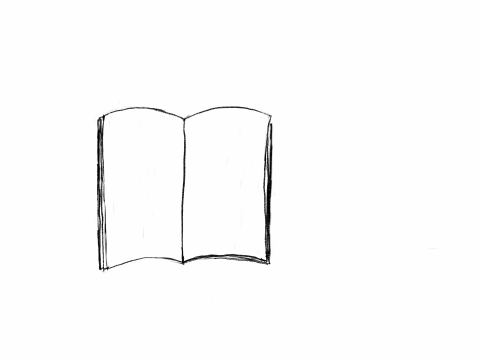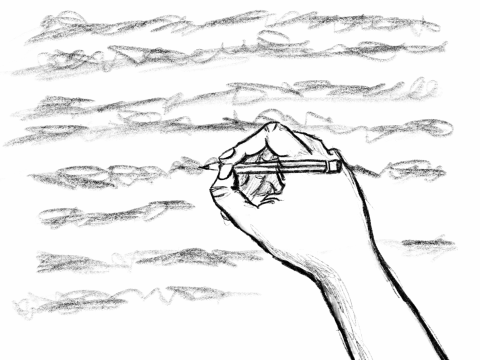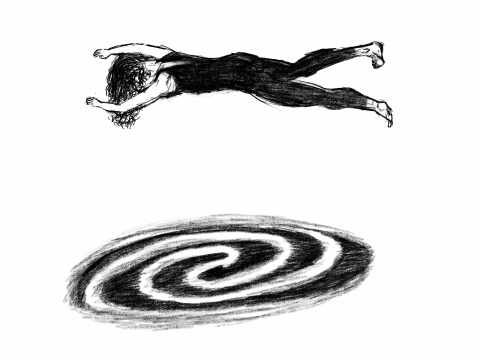On Writing And The Unknown
This essay first appeared in Strange Doors, my monthly substack newsletter.
Part 1. what are you writing about?
I’ve been my own personal archivist for several years now, documenting both the mundane and the dramatic moments of my life in journals.
At first it began as an occasional activity, with its own special rituals. But these rituals were soon overridden by the eagerness to just begin - whatever my environment looked like.
I documented my days with the diligence of a journalist on a deadline. I always kept a pen and paper in my pocket to catch ideas when they decided to strike.
The result? A towering stack of books full to the brim with diaries, drawings, doodles, diagrams, habit trackers, thought clouds, bits of overheard conversation, poetry, quotations, collages, comics, to-do lists, and sketches of the many future plans that rarely pan out…
These are my journals, the books on my shelves that defy any attempt to be read.
Granted, this might seem a little weird to you, depending on where on the scale you happen to fall between: people who obsessively keep journals and people who don’t.
But, none of this seemed at all strange to me.
Until, well meaning friend after well meaning friend - seeing my collection of journals and the speed at which I filled up new ones - would ask:
what do you write about when you journal?
Each time the question was asked, it searched for an answer that didn’t exist in my mind.
The moment this became most clear to me was on a flight to Cairo in 2022. I was sitting next to my mom filling page after innocuous page of my journal with writing. The in-flight meal came and went in my periphery and when my mom looked over and saw I was still writing after about an hour or so had passed, she finally asked me that age old question:
— what are you writing about?
Although this question wasn’t new I heard it as if for the first time.
Up until that moment, it was as if I was in a timeless trance between worlds and I was pulled out of its flow by her question.
Blank stare on my face, I looked up and heard her words as if on a delay echoing back in my mind… I couldn’t answer her, except to say:
— I don’t know.
She smiled at me then with her usual air of nonchalance and went back to reading her book, unaffected by our conversation. But the question stayed in my mind for months dividing and multiplying, growing and metastasizing until my whole body was full of nothing but this question.
What was I writing about? And how could I be writing so feverishly about what seems to be nothing?
Part 2. planes, trains, and automatic writing.
The smells of artificial fabrics and recirculated air, the colours blue and grey and a white light too stark for my eyes, the feeling of pressure building in my ears and a numbness in my legs…
These were the details I was technically writing down, but they didn’t really answer the question of what I was writing about. Because why would a sane person write any of this down?
Reading back the last pages of my journal, I saw that I had noted the conversation between myself and the flight attendant, just minutes ago:
— What would you like to drink Madame?
— عصير تفاح لو سمحت
— أيه ده، انتي مصرية؟
I wrote about the way his face creased into a beaming smile hearing my Arabic, delighted to learn I was Egyptian too. How it made me feel certain that small act of sharing a language was a kind of connection between us.
A few lines later, I complained, “I don’t like flying to Cairo at night, I miss the colour of the clouds, the sky, and I am overwhelmed by all the lights on the ground like displaced stars”.
These moments stand out to me in a sea of unfiltered information.
At a glance, my journals are messy, self indulgent and uninteresting texts. The ideas aren’t ordered in the way good stories should be. And reading them back, if interesting connections do emerge I’m convinced that it’s the act of reading - not writing - that’s doing the work.
The fact is: as I’m writing, I don’t know what I’m writing about. Which makes me question whether this practice is nothing more than sitting around and moving my hand.
I am, at best, noting details, thoughts and feelings that arise. At worst, I am wasting time without rhyme or reason, or even very good recall.
Is this what writing is? Is this what writers do?
Well, I’m participating in the activity people usually refer to as writing. I string letters into words and words into sentences and sentences into paragraphs in such a way that it’s considered communicable in human language. So: yes, I must be writing.
But. Writing is part of a language game that cannot be played alone. And when I journal, though it’s technically readable, I don’t write to communicate with anyone. In fact, I would be mortified if anybody ever actually read my journals. So: no, I must not be writing.
You see the problem.
Journalling seems to be this mysterious liminal activity: not quite writing, but not quite not writing… Something between writing and record keeping and storytelling.
It’s like, writing’s weird cousin.
You know how cousins are:
They seem normal from a distance, you share some interests with them and can hold a good conversation for a little bit. But when you try to get to know them deeply they deflect and misdirect.
When you think back to your conversations, you struggle to remember what you talked about. And if someone asks you anything at all significant about their lives or their politics, you’re left umming and ahhing and scratching your head, realising you don’t really know them very well at all…
Part 3. to be a stranger in your own body
Sometimes when I journal it feels like I’m following a stranger on the street with a notebook in hand, like a private detective. Only, my mind is the stranger and my memories are the street.
I am gathering details about this stranger, but I’m not sure if I have a case yet or what the questions I’m seeking to answer are.
Still, I am learning something about this person, like what they think, feel, and do in a day. I discover a lot of interesting things at this distance and I enjoy the sense of discovery.
Other times, it feels more like I’m watching a performance.
It’s as if my hands are doing the thinking, dancing across the stage of a blank page, creating shapes and stories and playing with my emotions without a need for any input from me.
I can be surprised and delighted at the leaps and bounds and tricks that happen when I step out of the way and I forget myself completely.
True, the experience of journalling is not always totally mysterious. Sometimes I’ll go through an intense event or have a meaningful conversation I want to remember, so I go to my journal with the intention to write something down.
But these moments are few and far between.
They are the exception, not the rule.
Most days, my journal is one of those strange doors I walk through without knowing where I’m going. Beyond creaking it open and stepping in, I have no idea what’s going to happen once I step into the dark.
And it’s not an uncommon experience that when I return to the world, I can’t remember where I’ve been.
Reading old entries back, I am often surprised by what I’m seeing because, it’s as if the words have been written by somebody else.
Over the years, I’ve never questioned these experiences but simply learned to enjoy the unfolding process I’m not fully in control of.
And, upon reflection, it’s this element of surprise that keeps me coming back. The sense that I’m discovering something new every time I sit down with a pen and paper and no plan.
The feeling that I’m hovering over the unknown.
Part 4. The unknown
There are two types of not-knowing.
There are the known unknowns, the things you have encountered before but don’t really understand or know for certain. Like why Portuguese sounds more Slavic than Spanish, or whether the band Kansas were actually from Kansas, or how the algorithm really works.
These are things that sit at the edge of your awareness in a muted shade of grey. Maybe one day you’ll learn these things, you think. Maybe today might even be that day. But until that moment comes, these unknowns stay in your periphery, marking the horizons of your knowledge and experience.
But there’s another more pervasive and perilous way of not-knowing. These are your serious blind spots. The immeasurable dark matter in the universe of your mind. The things you don’t even know that you don’t know. These are things it’s impossible to prepare for, or talk about. Because, what even are they? Who can say? Could be anything.
This is the stuff that can only be discovered when you step directly into the unknown. When you step towards the edge of that horizon of knowledge again and again, even as it expands with every step.
And these are the types of things I discover for myself when I write. When I am writing, I come face to face with my own ignorance: the unknown unknowns of my own life and experience. And I have a choice, to step forward or turn away.
This choice is the place where many of my ideas for essays begin. Usually it’s a question, or a phrase. Something that is begging to be unpicked, disassembled and put back together in a new and exciting shape. A four-dimensional tower of not-knowing.
The essay is a way of working out what I think and what I know in real time, or rather, what I don’t. It’s an attempt to connect to the not-yet-but-soon-to-be known.
Most of the time, it’s a humbling process, it’s not linear, and if you asked me while I was in the middle of it what I’m writing about, I probably couldn’t tell you with any certainty.
But I do it because I want to discover what I don’t know yet. To learn to ask better questions of myself and the world around me, and because, if I write only about what I know, there wouldn’t be much to say and it would be over very quickly. And where’s the fun in that?
So, the next time someone asks me what I’m writing about, I think I’ll answer with a more confident: I don’t know!
Delighted rather than ashamed at that fact, and certain that that’s the best description I can give them.
Whether or not you call that writing or not, it’s up to you.


